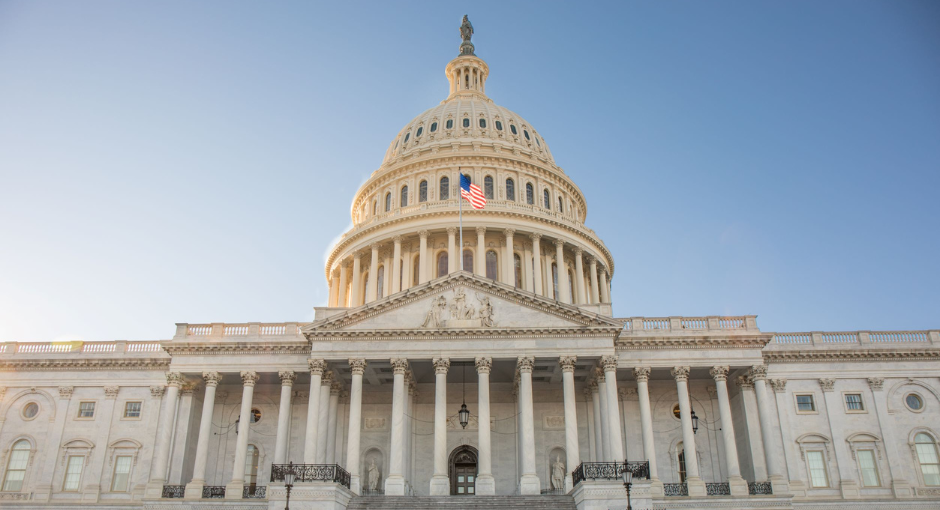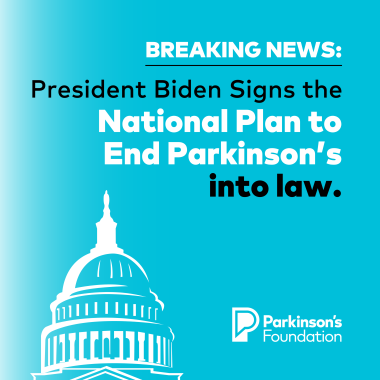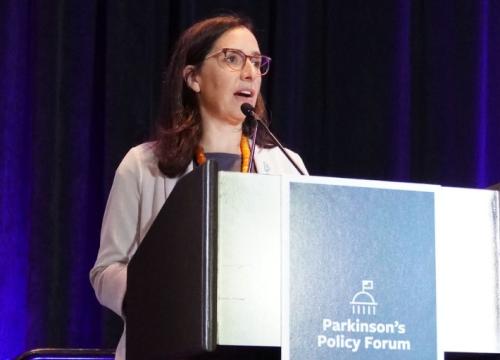The Latest on The National Parkinson's Project

The National Parkinson’s Project is a first-ever federal initiative to prevent and cure Parkinson’s disease, treat its symptoms and slow or stop its progression. The National Parkinson’s Project is being carried out under the National Plan to End Parkinson’s Act, by the Secretary of Health and Human Services (HHS).
What’s Next
The U.S. Department of Health and Human Services is building a supporting advisory council to develop the National Parkinson’s Project. This is a collaborative effort, as government agencies and leaders in the PD space, including the Parkinson’s Foundation, will provide essential community input and planning support.
The National Parkinson’s Project will encompass research, care, and services for Parkinson’s and all other neurodegenerative Parkinsonisms, including multiple system atrophy, corticobasal degeneration, progressive supranuclear palsy, and Parkinson’s-related dementia.
To receive updates on the Act, please sign up for the NIH listserv.
January 2025 Update
National Plan to End Parkinson's Update: NIH Seeks Nominations for Advisory PD Council
The National Institutes of Health (NIH) has received a delegation of authority to lead the implementation of the Dr. Emmanuel Bilirakis and Honorable Jennifer Wexton National Plan to End Parkinson’s Act, which was signed into law on July 2, 2024. Along with the HHS Office of the Assistant Secretary for Health (OASH), the National Institute of Neurological Disorders and Stroke (NINDS), part of NIH, will co-chair the Advisory Council on Parkinson’s Research, Care, and Services called for in this Act.
The NIH, with support from OASH and in collaboration with the Council, will create, maintain, and periodically update a National Plan to prevent, diagnose, treat and cure Parkinson’s, as well as stop disease progression.
The National Plan will encompass research, care, and services for Parkinson’s disease (PD) and all other neurodegenerative Parkinsonisms, including multiple system atrophy, corticobasal degeneration, progressive supranuclear palsy, and Parkinson’s-related dementia.
To receive updates on the Act, please sign up for the NIH listserv.
September 2024 Update
President Biden Signs Parkinson's Bill into Law
How to Make an Impact on Parkinson’s National Day of Action
On September 17, 2024, thousands of policy advocates across the country will virtually rally together to urge elected officials to take steps to better understand and address environmental risk factors for Parkinson’s disease (PD).
Led by the Unified Parkinson’s Advocacy Council, the Parkinson’s National Day of Action is entirely virtual, and it only takes a few minutes to participate! On September 17:
- Sign a petition to the White House urging them to ban paraquat, a harmful herbicide thought to increase Parkinson’s risk by as much as 500%.
- Call your member of Congress to ask them to cosponsor the HEALTHY BRAINS Act (H.R. 9233). This new bill would direct the federal government to research environmental risk factors for neurodegenerative diseases like Parkinson’s.
- Call Congress directly from your phone by looking up your senators’ and representatives’ office numbers online or by calling the U.S. Capitol Hill switchboard at 202-224-3121 and ask to be connected to their offices.
More than 1 million Americans live with Parkinson’s, the second most common and fastest growing neurological disease. Help us get closer to a cure by participating in the Parkinson’s National Day of Action!
July 2024 Update
On July 2, 2024, President Biden signed the National Parkinson's Project into law. This is the first-ever federal legislation dedicated to ending Parkinson’s disease (PD).
Top five ways this monumental bill can make an impact:
- Dramatically increase federal research funding
- Develop more effective pathways for treatments and cures
- Improve early diagnosis
- Spark new and improved models for patient care
- Address health disparities in diagnosis, treatment and clinical trial participation
“The Parkinson’s Foundation is excited for what comes next,” said John Lehr, Parkinson’s Foundation President and CEO. “We look forward to having input in designing exactly how this bill will mobilize meaningful change for the one million Americans living with this disease.”
The Parkinson’s Foundation would like to thank all the PD advocates, volunteers and people who wrote to their senators and representatives to make this bill to become law. We also thank President Biden and members of the U.S. Senate and House of Representatives for helping us make PD history.

Spread the word!
Share this monumental victory on your social media channels! Get friends and family excited that Parkinson’s disease has received legislative support.
Share the news on social media. Click here.
Timeline at a Glance:
- July 2, 2024: President Biden signs the National Parkinson's Project S.1064/H.R.8585), the first-ever federal legislation dedicated to ending Parkinson’s.
- May 23, 2024: U.S. Senate passes the Act.
- December 14, 2023: U.S. House of Representatives passes the Act.
- March 29, 2023: the Act is reintroduced in the House and Senate for the 2023 session.
What’s Next?
Follow us on social media (Facebook, X, Instagram and others) to stay up to date on what happens next. We are excited to document the process and any movement spurred by the new Act and our involvement alongside the Michael J. Fox Foundation and other leaders in the PD space to establish next steps.
May 2024 Update
On May 23, 2024, the U.S. Senate unanimously passed the National Plan to End Parkinson’s Act, the first-ever federal legislation dedicated to ending Parkinson’s disease (PD). Next, the bill will be sent to President Biden’s desk to be signed into law. The bill passed with overwhelming bipartisan support in the U.S. House of Representatives in December.
“As we eagerly await the bill to be signed into law, we applaud members of congress for their bipartisan support and recognition of one of the most pressing health care issues of our day,” said Parkinson’s Foundation President and CEO John L. Lehr. “On behalf of the Parkinson’s Foundation, I’d like to thank members of the United States Congress for joining the Michael J. Fox Foundation for Parkinson’s Research, the Unified Parkinson's Advocacy Council and the greater PD community in the fight against Parkinson’s disease.”
This monumental bill has the potential to shape the lives of the one million Americans living with Parkinson’s. It is designed to:
- Dramatically increase federal research funding
- Develop more effective pathways for treatments and cures
- Improve early diagnosis
- Spark new and improved models for patient care
- Create standards and measures to prevent Parkinson’s disease
- Address health disparities in diagnosis, treatment and clinical trial participation
- Enhance public awareness of the disease
Timeline at a Glance:
- On May 23, 2024, the U.S. Senate passed the National Plan to End Parkinson’s Act S.1064/H.R.8585), the first-ever federal legislation dedicated to ending Parkinson’s.
- On December 14, 2023, the Act passed through the U.S. House of Representatives.
- On March 29, 2023, the Act was reintroduced in the House and Senate for the 2023 session.
What’s Next?
Once President Biden signs the bill into law, the Federal government will begin to establish actionable steps to carry out the plan. The Parkinson’s Foundation looks forward to working alongside the Michael J. Fox Foundation and other leaders in the PD space to help throughout this process.
Content provided by The Michael J. Fox Foundation for Parkinson’s Research (MJFF). Read the MJFF blog article here.
December 2023 Update
Congress Reintroduces the National Plan to End Parkinson’s Act
On December 14, 2023, The National Plan to End Parkinson’s Act (S.1064/H.R.8585) passed through the U.S. House of Representatives. Next, the bill will go to the U.S. Senate.
Now is the time to have all of your members of Congress sign on to support the bill so it will pass this session!
Find our if your state’s Senator and Representative co-sponsored the bill:

Your senators and representatives need to hear from members of the Parkinson’s community about why we need a focused, national strategy to prevent Parkinson’s, find a cure, and ensure those living with the disease can access care.
Specifically, we encourage members of the Parkinson’s community in the U.S. to Call Your Members of Congress.
- Call Congress directly from your phone by looking up your senators’ and representatives’ office numbers online or by calling the U.S. Capitol Hill switchboard at 202-224-3121 and asking to be connected to their offices.
Telling Your Story: An easy step-by-step guide
Members of Congress and their staff want to know what is important to you and how to best represent you. Your representative and senators need to learn about what it is like living with Parkinson’s — or loving or knowing someone with Parkinson’s — so they can understand why it is important to support The National Plan to End Parkinson’s Act (S.1064/H.R.8585).
Here is an easy way to help you tell your story to members of Congress and their staff:
- Hello, my name is ____________________, and I live in _____________.
- I would like to ask you to support The National Plan to End Parkinson’s Act (S.1064/H.R. 8585), and I’d like to start off by telling you why it’s important and so personal to me, if that’s okay with you and you have the time.
- I was diagnosed/My loved one was diagnosed with Parkinson’s disease in _____. Here is a little bit of information about the impact Parkinson’s has had on my/their life:
- Impact at work
- Impact at home with daily tasks
- Impact on family and friends
- Impact on finances
- Impact on other areas of life that you wish to share
- There is no way to slow, stop, or reverse Parkinson’s from progressing.
- There is also no way to prevent Parkinson’s, and there is no cure for the disease.
- Parkinson’s is the fastest-growing brain disease in the world, and more than a million people in the U.S. have Parkinson’s.
- I’d like to ask you to support The National Plan to End Parkinson’s Act (S.1064/H.R. 8585) so that the government and private sector can come together to end this disease. This is a bipartisan bill, and it comes at no cost. Supporting this bill is important to me and to others in our area and across the United States.
I hope you will help contribute to a cure by co-sponsoring this legislation.
On July 28, 2022, the U.S. House of Representatives introduced the first-ever legislation solely devoted to ending Parkinson’s. This is a historic moment for the Parkinson’s community!
The National Plan to End Parkinson’s Act will, for the first time, unite the federal government and private enterprises in a mission to prevent and cure Parkinson’s, alleviate financial and health burdens on American families, and ensure those living with the disease have access to the care they need.
This bipartisan legislation is led by Representative Paul Tonko (D-NY) and Representative Gus Bilirakis (R-FL). The Parkinson’s community is thankful for its leadership.
Now what?
This bill will go through the traditional congressional process and will need to be voted on by the House. A Senate’s companion bill will be introduced in the coming weeks, because it is standard congressional procedure for both chambers of Congress to pass the bill before it can go to the President for signature.
Why a national plan and why now?
Parkinson’s is a disease that requires a national effort to cure and prevent. Parkinson’s costs the U.S. $52 billion every year, half of which is shouldered by the federal government, and that annual cost is expected to grow to $80 billion by the year 2037.
A national plan to end Parkinson’s has the potential to:
- Dramatically increase federal research funding
- Develop more effective pathways for treatments and cures
- Improve early diagnosis
- Spark new and improved models for patient care
- Create standards and measures to prevent Parkinson’s disease
- Address health disparities in diagnosis, treatment and clinical trial participation
- Enhance public awareness of the disease
The public-private advisory council created as part of this legislation will report every year to Congress on their progress and impact in ending Parkinson’s. This is the kind of forward-looking strategy and responsible accountability the Parkinson’s community needs and deserves.
The Parkinson’s Foundation is a member of the Unified Parkinson’s Advocacy Council (UPAC), a collection of nearly 30 Parkinson’s organizations that come together to help shape federal and state public policy in ways that support the Parkinson’s community. There will be many opportunities for all of us to engage our Members of Congress on this legislation and have conversations about the bill and its intended impact, and we will begin to communicate those opportunities in the coming weeks.
Content provided by The Michael J. Fox Foundation
We will update this blog and our social media channels as the legislation advances, so stay tuned! Follow us on Facebook, Instagram and Twitter.
Related Blog Posts

Meet the Researcher Working to Restore Sleep in Parkinson’s

